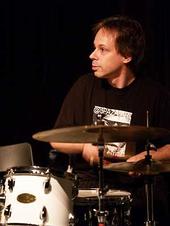Composer-percussionist Lukas Ligeti is developing a style of music uniquely his own, drawing upon Downtown New York experimentalism, contemporary classical music, jazz, electronica, as well as world music, particularly from Africa. His CD "Mystery System" (Tzadik Records) has been hailed as "the future of music" (Jan P. Dennis, amazon.com), and he has been called "a distinctive and energetic voice...that walks a skillful line between the comprehensible and the unpredictable" (San Francisco Chronicle), and "a young musician with enormous imagination and energy" (Fanfare Magazine), The Wire writing that "Lukas Ligeti...practises what many other composers only preach in the abstract". His collaborations with African musicians have been described as "a 21st-century African music" (Mike Cooper, Folk Roots) and "a new dimension in the dialogue between Africa and the Western world" (Ulrich Olshausen, Frankfurter Allgemeine Zeitung).
Oblivious to categorizations such as “classicalâ€, “popâ€, etc., Lukas' main interests include cultural exchange, new forms of interplay between musicians in an ensemble, polyrhythms/polytempo structures, and non-tempered tunings, and his music ranges from the through-composed to the free-improvised. Other major sources of inspiration include experimental mathematics, computer technology, architecture and visual art, sociology and politics, and traveling.
His concert music has been commissioned by Bang on a Can, the Vienna Festwochen, Ensemble Modern, Kronos Quartet, Colin Currie and HÃ¥kan Hardenberger, the American Composers Forum, New York University, ORF Austrian Broadcasting Company, Radio France, and many others; he has also composed for dance, film, and installation.
He frequently performs solo on electronic percussion, and as a drummer co-leads several bands, such as Burkina Electric, Hypercolor, and the Raoul Björkenheim/Lukas Ligeti Duo; a number of new projects are in the works. He has also performed and/or recorded with John Zorn, Henry Kaiser, Gary Lucas, Michael Manring, Daniel Carter, Benoît Delbecq, John Tchicai, Pyrolator, Elliott Sharp, Jim O’Rourke, Robert Dick, Gianni Gebbia, Massimo Pupillo, Aly Keita, Borah Bergman, and many others.
In 1994, commissioned by the Goethe Institute, he conducted a workshop in Abidjan, Côte d’Ivoire, and co-founded the experimental, intercultural group Beta Foly, leading to numerous residencies in that city, much touring in Europe, and the release of his first CD as a bandleader, “Lukas Ligeti & Beta Foly†on Intuition Music in 1997. He has worked on a project involving the Batonka people of the Lake Kariba area, performing in Zimbabwe and Mozambique; collaborated with Nubian musicians in Egypt, culminating in a joint concert at the Cairo Opera; composed a piece for musicians of different Caribbean cultures which premiered in Miami Beach; and, since 2000, has collaborated with singer Maï Lingani from Burkina Faso. Their newest joint project, Burkina Electric , began in 2004 and combines the traditional music of that country with dance-oriented electronica; the band is currently touring in the U.S. and recently released the double EP "Rêem Tekré" with remixes by DJ Spooky and others on Atatak Records (Germany). In 2005, Lukas was featured at the Unyazi festival in Johannesburg, South Africa, the first ever festival for experimental electronic music in Africa, and in 2006, he was composer-in-residence at the University of the Witwatersrand in Johannesburg. In 2007, he traveled to Uganda to collaborate with that country's premier music/dance/theater group, the Ndere Troupe.
Lukas Ligeti was born in Vienna, Austria into a remarkable artistic family with ancestors such as violinist Leopold Auer (teacher of Heifetz and Milstein), architect/designer Marcel Breuer, and, of course, his father, the great composer György Ligeti. Lukas himself focused on writing and science during his school years, taking up the drums only after graduating from high school. He studied composition and percussion at the University for Music and Performing Arts in Vienna, obtaining a masters degree, and then moved to the U.S. After working for two years at the Center for Computer Research in Music and Acoustics at Stanford University, he has lived in New York City since 1998.
